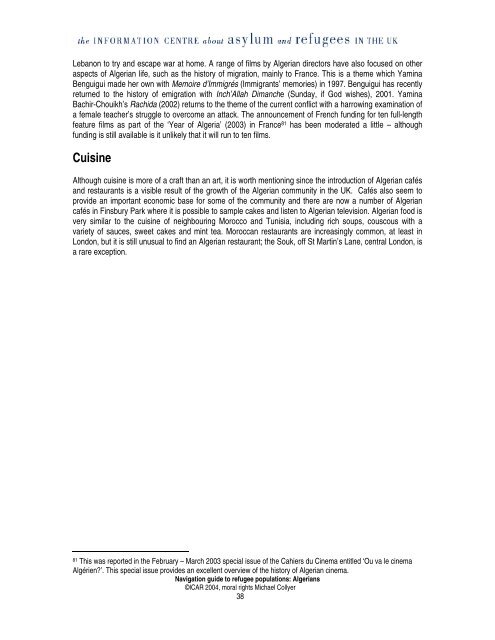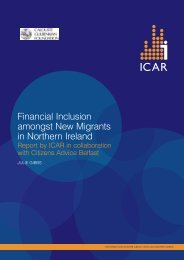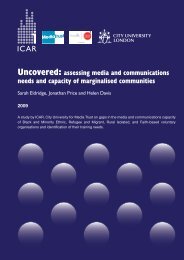Navigation guide Refugee populations in the UK: Algerians - ICAR
Navigation guide Refugee populations in the UK: Algerians - ICAR
Navigation guide Refugee populations in the UK: Algerians - ICAR
You also want an ePaper? Increase the reach of your titles
YUMPU automatically turns print PDFs into web optimized ePapers that Google loves.
Lebanon to try and escape war at home. A range of films by Algerian directors have also focused on o<strong>the</strong>r<br />
aspects of Algerian life, such as <strong>the</strong> history of migration, ma<strong>in</strong>ly to France. This is a <strong>the</strong>me which Yam<strong>in</strong>a<br />
Benguigui made her own with Memoire d’Immigrés (Immigrants’ memories) <strong>in</strong> 1997. Benguigui has recently<br />
returned to <strong>the</strong> history of emigration with Inch’Allah Dimanche (Sunday, if God wishes), 2001. Yam<strong>in</strong>a<br />
Bachir-Chouikh’s Rachida (2002) returns to <strong>the</strong> <strong>the</strong>me of <strong>the</strong> current conflict with a harrow<strong>in</strong>g exam<strong>in</strong>ation of<br />
a female teacher’s struggle to overcome an attack. The announcement of French fund<strong>in</strong>g for ten full-length<br />
feature films as part of <strong>the</strong> ‘Year of Algeria’ (2003) <strong>in</strong> France 81 has been moderated a little – although<br />
fund<strong>in</strong>g is still available is it unlikely that it will run to ten films.<br />
Cuis<strong>in</strong>e<br />
Although cuis<strong>in</strong>e is more of a craft than an art, it is worth mention<strong>in</strong>g s<strong>in</strong>ce <strong>the</strong> <strong>in</strong>troduction of Algerian cafés<br />
and restaurants is a visible result of <strong>the</strong> growth of <strong>the</strong> Algerian community <strong>in</strong> <strong>the</strong> <strong>UK</strong>. Cafés also seem to<br />
provide an important economic base for some of <strong>the</strong> community and <strong>the</strong>re are now a number of Algerian<br />
cafés <strong>in</strong> F<strong>in</strong>sbury Park where it is possible to sample cakes and listen to Algerian television. Algerian food is<br />
very similar to <strong>the</strong> cuis<strong>in</strong>e of neighbour<strong>in</strong>g Morocco and Tunisia, <strong>in</strong>clud<strong>in</strong>g rich soups, couscous with a<br />
variety of sauces, sweet cakes and m<strong>in</strong>t tea. Moroccan restaurants are <strong>in</strong>creas<strong>in</strong>gly common, at least <strong>in</strong><br />
London, but it is still unusual to f<strong>in</strong>d an Algerian restaurant; <strong>the</strong> Souk, off St Mart<strong>in</strong>’s Lane, central London, is<br />
a rare exception.<br />
81 This was reported <strong>in</strong> <strong>the</strong> February – March 2003 special issue of <strong>the</strong> Cahiers du C<strong>in</strong>ema entitled ‘Ou va le c<strong>in</strong>ema<br />
Algérien’. This special issue provides an excellent overview of <strong>the</strong> history of Algerian c<strong>in</strong>ema.<br />
<strong>Navigation</strong> <strong>guide</strong> to refugee <strong>populations</strong>: <strong>Algerians</strong><br />
©<strong>ICAR</strong> 2004, moral rights Michael Collyer<br />
38

















